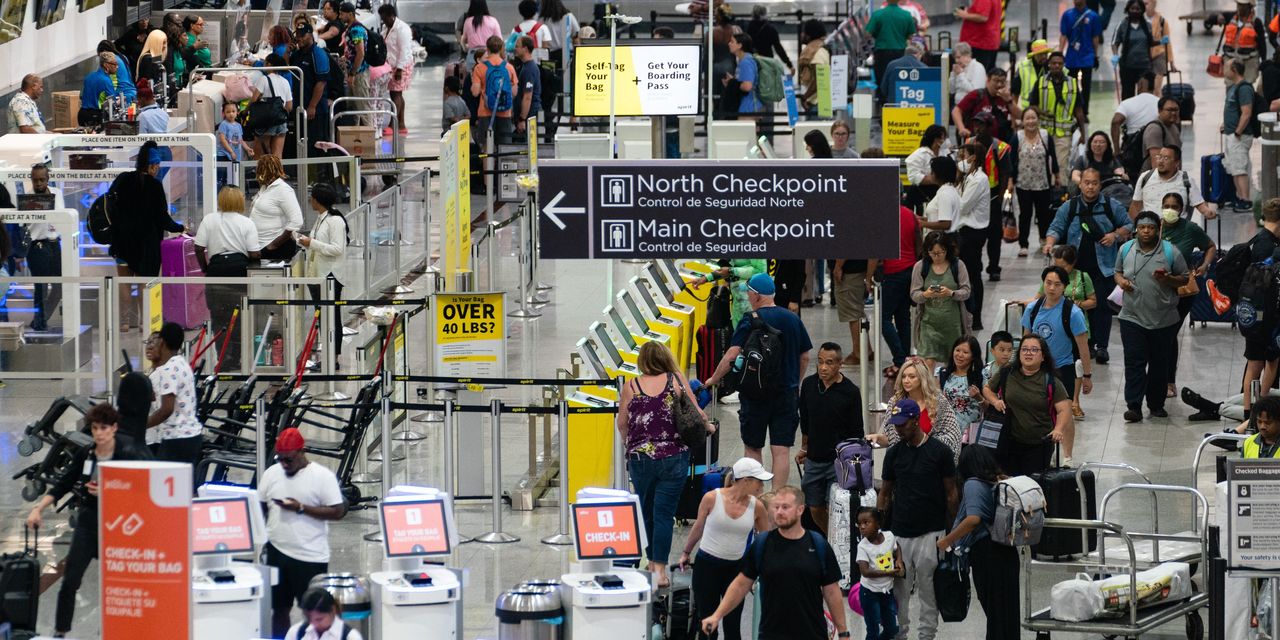The July Fourth holiday was a record-breaking period for travel, taking a sledgehammer to the notion that consumers are beginning to pull back on travel spending.
Friday, June 30, was the busiest air travel day on record, as the Transportation Security Administration screened more than 2.88 million passengers, beating the previous record on the Sunday after Thanksgiving in 2019. Travel records were broken at airports across the country over the weekend, the TSA added.
Other data aren’t as strong: Airfares fell for a second consecutive month in May, according to U.S. inflation data, while hotel demand has receded for three straight months, the U.S. Travel Association says. But those numbers largely reflect domestic trends, masking a boom in overseas travel.
After “three summers where Americans vacationed domestically, we observe that they are heading internationally this summer,” Truist analyst Patrick Scholes says.
The numbers support that. Airfares to Europe from the U.S. are averaging $1,200 per round trip, says online travel agency Hopper—the highest in more than five years. London hotel room rates surged close to 20% in May, industry tracker STR says.
The overseas travel trend could pay off nicely for investors.
Truist analysts say
Hyatt Hotels
(ticker: H) is their favorite hotel stock, noting that around 30% of its earnings come from its business with Caribbean-centric Apple Leisure Group, a big provider of packaged travel. Hyatt could also benefit from leisure demand strength in Europe. Analysts have an average price target of $127.53 on the stock, according to FactSet data, implying an 11% upside to its recent price.
Cruise-line stocks have led the travel industry’s march higher in 2023, partly because of the industry’s inherent international focus.
Royal Caribbean Group
(RCL) is up 107% in 2023,
Carnival
(CCL) has climbed 136%, and
Norwegian Cruise Line Holdings
(NCLH) is up 78%.
Stifel analyst Steven Wieczynski argues Royal Caribbean can climb another 17%, to $120. He says that despite fears over a consumer softening, “there is at least another two-to-three-year pent-up backlog in demand.”
Airline stocks have also been on a hot streak, despite an apparent weakening in domestic ticket prices.
Airfares fell 3% in May, after a 2.6% decrease in April, according to U.S. consumer price index data. That isn’t necessarily a sign of falling demand; it could reflect declining fuel costs. What’s more, J.P. Morgan analyst Jamie Baker notes, CPI is “highly skewed” to domestic data and “there’s currently an ongoing year-over-year shift from domestic to international destinations.”
That explains the outperformance of
United Airlines Holdings
(UAL),
Delta Air Lines
(DAL), and
American Airlines Group
(AAL)—the U.S. carriers with the greatest international exposure. They each have climbed more than 40% in 2023.
Wall Street thinks Delta stock can rise another 19%, while analysts see an 18% upside to United’s stock, according to average price targets on FactSet.
The normalizing of domestic demand is good news for the Federal Reserve in its inflation battle. But it isn’t a bad thing for travel stocks—at least for those exposed to the summer international boom.
Write to Callum Keown at [email protected]
Read the full article here





